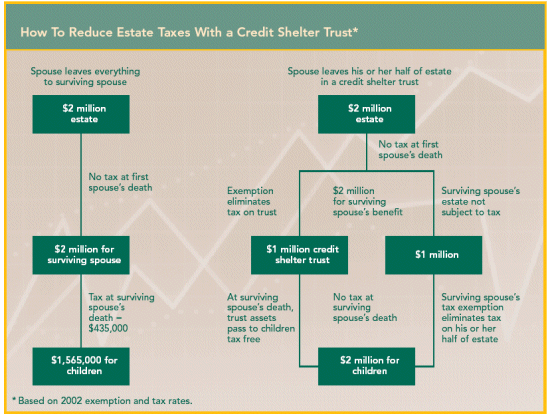
Here’s a look at the most important estate planning tools and how you can use them to minimize taxes and maximize your estate’s value as the tax rules change over the decade. You’ll learn how the marital deduction, lifetime gift and estate tax exemption, various trusts, life insurance, family business structures, charitable contributions, and other estate planning techniques can help you achieve your goals. You will also see why it will be helpful to seek professional financial, tax and legal advice about ways to use these techniques effectively. Please let us know if you have any questions about how they might apply to your situation.

The Marital Deduction
The marital deduction is one of the most powerful estate planning tools. Any assets passing to a surviving spouse pass tax free at the time the first spouse dies, as long as the surviving spouse is a U.S. citizen. Therefore, if you and your spouse are willing to pass all your assets to the survivor, no federal estate tax will be due on the first spouse’s death—even before the estate tax is repealed.
But this doesn’t solve your estate tax problem. First, if the surviving spouse does not remarry, that spouse will not be able to take advantage of the marital deduction when he or she dies. Thus, the assets transferred from the first spouse could be subject to tax in the survivor’s estate, depending on when the surviving spouse dies. Second, from a personal perspective, you may not want your spouse to pass all assets to a second spouse even if it would save estate taxes.
Preserve Both Exemptions with a Credit Shelter Trust
Since assets in an estate equal to the exemption amount are exempt from estate taxes, a married couple can use their exemptions to avoid tax on up to double the exemption amount. And this amount will gradually increase until it reaches $7 million in 2009—the year before the estate tax repeal. (See Chart below.) An effective way to maximize the advantages of the exemption is to use a credit shelter trust.

Let’s look at an example:
As shown in the Chart, Mr. and Mrs. Jones have a combined estate of $2 million. At Mr. Jones’ death in 2002, all of his assets pass to Mrs. Jones—tax free because of the marital deduction. Mr. Jones’ taxable estate is zero. Shortly thereafter, and still in 2002, Mrs. Jones dies, leaving a $2 million estate. The first $1 million is exempt from estate tax, but the remaining $1 million is subject to $435,000 in taxes, leaving only $1,565,000 for the children.
The problem? Mr. and Mrs. Jones took advantage of the exemption in only one estate.
Let’s look at an alternative:
As shown in the Chart, Mr. Jones’ will provides that assets equal to the exemption go into a separate trust on his death. This “credit shelter trust” provides income to Mrs. Jones during her lifetime. She also can receive principal payments if she needs them to maintain her lifestyle. Because of the trust language, Mr. Jones may allocate his $1 million exemption amount to the trust to protect it from estate taxes. If there were remaining assets (assets over $1 million), they would pass directly to Mrs. Jones.
Because the $1 million trust is not included in Mrs. Jones’ estate, her estate drops from $2 million to $1 million. Thus, no tax is due on her estate because it does not exceed the exemption amount. By using the credit shelter trust in Mr. Jones’ estate, the Joneses save $435,000 in federal estate taxes.
The Joneses do give up something for this tax advantage. Mrs. Jones doesn’t have unlimited access to the funds in the credit shelter trust because if she did, the trust would be includable in her estate. Still, Mr. Jones can give her all of the trust income and any principal she needs to maintain her lifestyle. And the family comes out ahead by $435,000. But the outcome would be quite different if both spouses didn’t hold enough assets in their own names. (See Case Study, above.)

Control Assets with a QTIP Trust
A common estate planning concern is that assets left to a spouse will eventually be distributed in a manner against the original owner’s wishes. For instance, you may want stock in your business to pass only to the child active in the business, but your spouse may feel it should be distributed to all the children. Or you may want to ensure that after your spouse’s death the assets will go to your children from a prior marriage.
You can avoid such concerns by structuring your estate plan so your assets pass into a qualified terminable interest property (QTIP) trust. The QTIP trust allows you to provide your surviving spouse with income from the trust for the remainder of his or her lifetime. You also can provide your spouse with as little or as much access to the trust’s principal as you choose. On your spouse’s death, the remaining QTIP trust assets pass as the trust indicates.
Thus, you can provide support for your spouse during his or her lifetime but retain control of the estate after your spouse’s death. Because of the marital deduction, no estate taxes are paid on your death. But if your spouse dies while the estate tax is in effect, the entire value of the QTIP trust will be subject to estate tax.
Case Study: Splitting Assets Without Splitting Up the Marriage
Does it matter which spouse dies first? Maybe. Assume Mr. Jones owns $1.5 million of assets under his name and Mrs. Jones has $500,000 under her name. If Mr. Jones dies first, the credit shelter trust can be funded with the $1.5 million under his name. But if Mrs. Jones dies first, only the $500,000 under her name would be available to fund the trust. Mrs. Jones’ estate can take advantage of only $500,000 of her $1 million exemption amount.
To take maximum advantage of the credit shelter trust strategy, be sure property in your estate totals at least the exemption amount. Ensuring each spouse has enough assets may require reviewing how your assets are currently titled and shifting ownership of some assets. Even if you can’t perfectly divide assets, any assets owned up to the lifetime exemption limit will reduce the total tax.
A warning here is appropriate: Assets can be retitled between spouses without any negative federal tax effect, but some states treat transfers between spouses as taxable gifts for state tax purposes. Seek professional advice before transferring titles.
Material discussed is meant for general illustration and/or informational purposes only and it is not to be construed as tax, legal, or investment advice. Although the information has been gathered from sources believed to be reliable, please note that individual situations can vary therefore, the information should be relied upon when coordinated with individual professional advice.
Article from CalcXML.com
